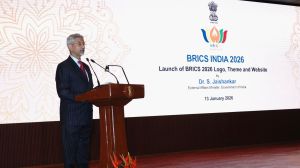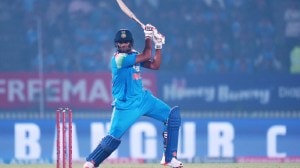Steeped in saffron
In the four months that he has been occupying Bihar's Raj Bhavan, Sunder Singh Bhandari has rarely been out of the news. It is a novel si...

In the four months that he has been occupying Bihar8217;s Raj Bhavan, Sunder Singh Bhandari has rarely been out of the news. It is a novel situation for the hard-core RSS man who was accustomed to working behind the scenes. But after years in the shadows, he is clearly enjoying the limelight.
Raj Bhavans are no longer the domain of senior, apolitical statesmen. It was almost a foregone conclusion that Bhandari would recommend dismissal of the Rabri Devi Government and imposition of President8217;s Rule in Bihar. As the BJP vice-president, he had gone on record to state that Bihar was a 8220;fit case8221; for Article 356. Bhandari-watchers believe that his frequent comments on the abysmal state of law and order in the state 8212; beginning practically from the day he assumed office 8212; were just preparing the ground for Rabri8217;s dismissal.
But RSS and BJP leaders who have known him for decades claim that this is only the result of extreme provocation at the hands of Chief Minister Rabri Devi, who has till date not paid him acourtesy call and even described him as a 8220;langda8221; cripple in the state Assembly, in an unkind reference to his arthritis problem. But Bhandari is not a man to react to humiliation, nor is he given to shooting his mouth off.
Though he is equivalent in seniority to Atal Behari Vajpayee and L.K. Advani, he has been passed over four times for the post of BJP president. Once by a rank junior, Murli Manohar Joshi. But in the tradition of the Sangh Parivar, to which he is totally committed, Bhandari continued to silently soldier on, doing whatever task he was assigned, even as those far junior to him rose in stature and prominence in the party organisation.
In fact, insiders say that Bhandari was reluctant to accept governorship, fearing that his political career would be affected. But when he was asked to go to Bihar, he went without a murmur.
If Bhandari8217;s life and style were to be encapsulated in a few words, they would be uncompromising rigidity, discipline and simplicity. Unlike his flamboyantnamesake, former Uttar Pradesh governor Romesh Bhandari with whom he is being compared after recommending President8217;s Rule, Bhandari reportedly owned only three pairs of white khadi dhotis and kurtas, and washed them himself, before he became the Governor. In the tradition of RSS pracharaks, who are expected to be celibate, Bhandari is a bachelor. And true to his Jain origins, he eats neither onions nor garlic.
A puritan, he is uncomfortable with the BJP8217;s recent philosophy of 8220;practical politics8221; and watched disapprovingly 8212; but without comment 8212; as the party admitted all and sundry before the general election.
Many of the BJP8217;s younger leaders believe that Bhandari is out of sync with the demands of modern-day politics. Indeed, since the mid-8217;80s, when the then BJP president L.K. Advani inducted and groomed a host of younger leaders, Bhandari has been getting increasingly isolated, his brand of orthodox, uncompromising politics finding few takers in the party. In 1989, he opposed the BJP8217;sunderstanding with the Janata Dal, but was overruled.A contemporary of such Jan Sangh stalwarts as Deendayal Upadhyay and Nanaji Deshmukh, Bhandari was the Rajasthan in-charge he belongs to the state when Advani was only a district-level worker in the unit. He is also credited with having groomed Rajasthan Chief Minister Bhairon Singh Shekhawat.
Now 77, Bhandari is famous for speaking his mind at party meetings 8212; not common in the BJP 8212; and has sometimes shocked and angered his colleagues with his plainspeaking. 8220;He doesn8217;t care if his opinions upset others. He says what he thinks is right. But then he faithfully follows the party line even if it goes against his own views,8221; remarks a leader.
Bhandari8217;s cantankerous manner has often upset even his contemporaries, but his seniority has shielded him. He was one of the first persons to be loaned by the RSS to the Jan Sangh when it was formed in 1951 and remained its Rajasthan general secretary till 1964. In 1972, he became the Jan Sangh8217;s organisationin-charge under Vajpayee8217;s presidentship. He has also been a Rajya Sabha MP three times.
When the BJP was formed in 1980, he was once again given the position of all-India general secretary organisation. In fact, organisational matters are his forte. He is credited with conceptualising and establishing the entire structure of the BJP party committees from the ward and mandal level upwards which, unlike other parties, matches the election structure.
Bhandari is also acknowledged as the architect of the BJP8217;s party constitution. As a lawyer though he practised for only a brief period before giving it up to become a full-time RSS pracharak, his expertise in party constitution matters is unparalleled, according to BJP leaders. And his dogged insistence has prevailed over other leaders8217; desire to sometimes postone the BJP8217;s two-yearly organisational elections. 8220;The party constitution is his Bible,8221; says a party functionary.
Over the years, Bhandari has been the party in-charge in Rajasthan, Gujarat,Madhya Pradesh and Uttar Pradesh. While he was reasonably successful in UP, his stint in MP saw him getting hopelessly embroiled in the state unit8217;s factional feuds, until he was replaced by Kushabhau Thakre.
8220;He often gets taken in by appearances because he judges people by his own simplicity and directness. And his rigidity makes him difficult to get along with,8221; says a critic. Despite his angularities, however, Bhandari commands a grudging respect. Comments a party leader: 8220;He may be dry and stubborn but he is as demanding of himself as he is of others. He is a politician in the old mould.8221;
- 01
- 02
- 03
- 04
- 05































